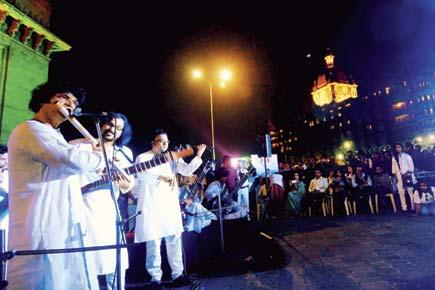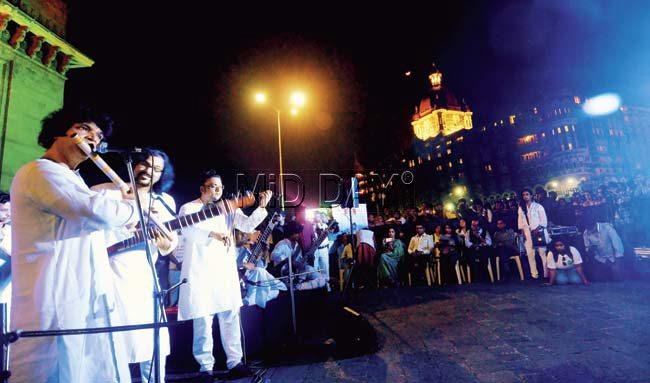Aftermath of the 26/11 attacks. Some random jottings and memories...

A Chief Minister (CM) lost his chair post the attacks. The late Vilasrao Deshmukh along with son Riteish Deshmukh and filmmaker Ram Gopal Verma, visited the terror site earning the wrath of an outraged city.

A group of 25 musicians performed opposite the Taj Mahal hotel, whose burning spires became the most visible symbol of the attacks as a memorial to those slain in 26/11. Pic/Sameer Markande
ADVERTISEMENT
Deshmukh had to leave his seat. His son Riteish was quoted in some reports saying that people could shoot him if he ever acted in a film on the attacks. Ram Gopal Verma did go on to make a highly forgettable film on 26/11, after denying that he intended to make a movie on the attacks.
Mumbaikars came out on the roads holding posters and placards against the Government which they claimed failed to act with alacrity against attackers. Many of them abused politicians for their flippant reactions. It was a show of people power like no other.
One Minister was called unprintable names on the posters. A gentleman from the US who happened to be visiting Mumbai at that time told somebody, “This is democracy. Where you can come out on the streets and abuse your leaders.”
The then Prime Minister Manmohan Singh mumbled a few inadequate lines in response to the attacks, to a country which was thirsting for a strong response even if only in words. Books of various merit were published post the attacks. People wanted to tell the story. The Mumbai terror attacks have unfortunately got a dubious kind of fame all over the world.
They have become a ‘yardstick’ for other terror attacks. Now, newspaper reports read that terrorists were planning ‘Mumbai-style attacks’ whenever a terror attack is foiled in other countries. A shameful comparison but one that cannot be disputed.
The attacks threw up unlikely heroes. So many of them, that it is difficult to recount all here. People who put their life on the line shepherding others out of train stations and saving hundreds of lives. Police who confronted AK-47s with lathis, in an unequal battle.
Hotel staff who died saving the lives of guests in the hotels attacked. The hospitality industry could not have been prouder of these young men and women who gave a new definition to the phrase, ‘service with a smile’.
Mumbai’s little known Nariman House or Chabad House was on the radar of the Mumbaikar. Suddenly people were asking, ‘What is the Chabad House?’ The terrorists killed Jews in the Chabad House. They were killed specifically because they were Jews.
In a global world, it was the first, shocking evidence that Mumbai was caught up in the vortex of the Israel-Palestine problem. Today, to understand 26/11 or 9/11 for that matter, people have to know the Israel-Palestine history. That conflict is the flashpoint of the world. Baby Moshe, who lost his parents in the attacks, became a symbol of this confrontation.
So many felicitations for heroes followed those attacks. Clubs and organizations in the city held functions and tributes, memorials for those slain in these attacks. At one such discussion about policing in the city, children of police personnel who lost their lives in the attack, were brought on to the stage.
Many of them stated that they wanted to grow up and become police to fight terror. Those answers, naïve though they have been, moved the most cynical to thunderous applause. At a book launch in the city (the book was not related to the terror attacks) an elderly SoBo gentleman was asked to speak, about a subject related to the book.
This gent from a well-known business family lost his son and daughter-in-law in the attacks. His son, along with his daughter-in-law was dining in one of the hotels when the terrorists struck. The grief-stricken father said that any death is acceptable, but not a death like this.
He claimed, and his hand holding the mike started to shake at that juncture, that his son was to go overseas on a business trip, but he postponed it and stayed in Mumbai. Then, he said that they (his family) had had such a happy life till then. His voice shook and he wept copious tears as he said, “Today, nothing scares me.
Not even death. I am ready to drop dead, right here, right now,” he finished on the dais as his audience wept with him. The Mumbai marathon of January 2009, run inside of two months following the attacks, had added security. For the first time, marathoners passed through metal detectors at the Azad Maidan before trooping to the start line. The Mumbai marathon’s age of innocence had ended.
It was still dark when the 42-km (full marathon) participants started their race. As they neared the NCPA and turned from there on the course, most of them turned to look at the Oberoi-Trident opposite, as if in silent salute to those who died there.
Even the Africans, the ebony-hued running machines who don’t stop for anything, slowed for a few precious seconds to stare at the hotel, target of the attacks. Next to them Marine Drive stretched out and the sea crashed on to the rocks.
The salt from those waves, were as salty as the tears of those who stood near the Marine Drive for three days and wept in disbelief and despair when they knew their loved ones were not coming out of that hotel, alive.
The full marathoners bit back their pain that year, because they knew that screaming lungs and aching limbs were nothing in comparison to the pain of a city who lost so much on those three days.
 Subscribe today by clicking the link and stay updated with the latest news!" Click here!
Subscribe today by clicking the link and stay updated with the latest news!" Click here!







